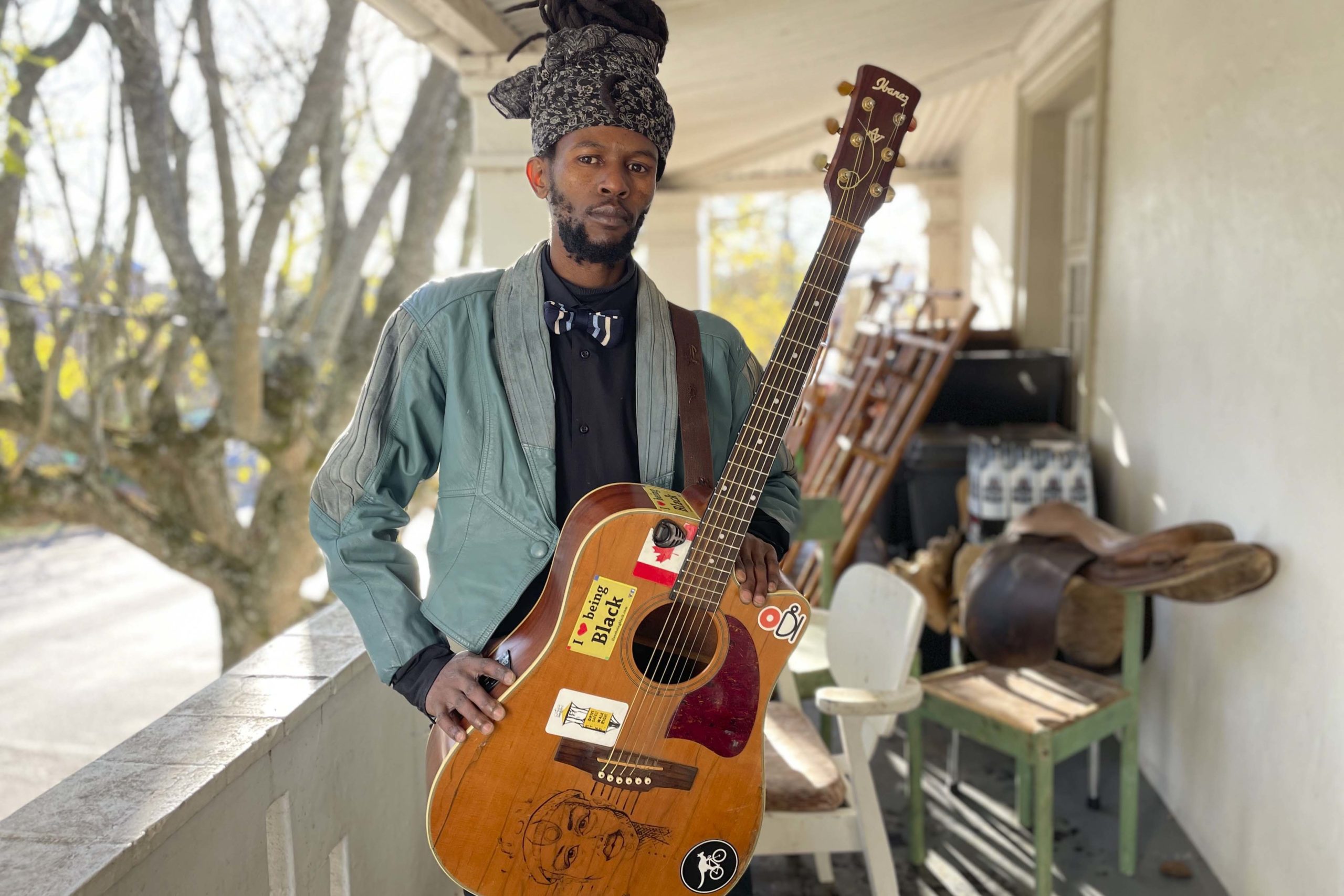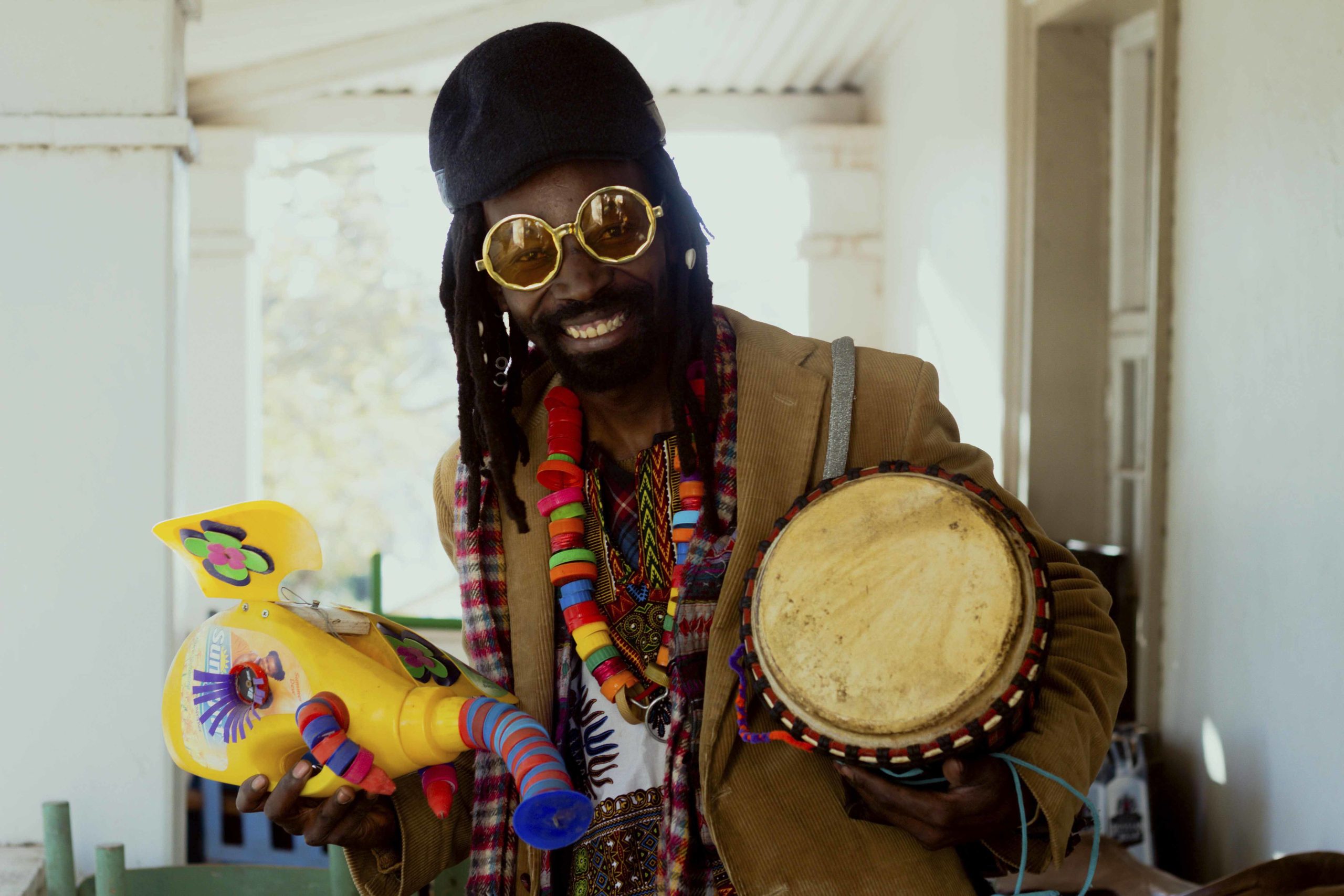Azuri and the art of creating on the edge
Musicians struggle to make a living, but despite the many problems they routinely face, Joburg band Azuri Street Symphony carry on ‘looking for simple things that make life matter’.
Author:
8 September 2021

On the fringes of the fringe is not a profitable place for any musician to be, especially in a small town during an unexpected level four Covid-19 lockdown. Azuri Street Symphony is a Johannesburg-based world-music band who, for the National Arts Festival from 8 to 18 July, had been booked to perform in 20 gigs at venues across Makhanda in the Eastern Cape.
But their performances were cancelled suddenly when President Cyril Ramaphosa declared a level four Covid-19 lockdown. Without any way to earn money to pay for accommodation, they took refuge in the apartment of one of the festival’s technical directors, spending the month communing with local artists and developing new material.
The five-year-old band is made up of Obusitswe Seage, 38, Jermaine Burts, 40, Letlhogonolo Kutu, 34, and Teboho Ngakane, 23. They met in Newtown and are often found performing live in Jozi’s Maboneng precinct where they play music for social change.
Seage, percussionist and singer, is the son of the late anti-apartheid artist Lucas Seage. He describes himself as a maverick social entrepreneur and community changemaker.
Ngakane is part of the Global Models Network, with her bandmates describing her as an “Iman or Zozibini Tunzi with an edge”. Burts is born of music royalty, with his father and uncles all part of The Rockets. Kutu, the band leader, wears many hats. He is a singer, guitarist, print maker, artist and youth and community developer. For example, he has worked on #SciBono Youth Steam, a series of projects to interest children and the youth in science.
While Burts and Ngakane headed to Cape Town this winter, Seage and Kutu found themselves in Makhanda hoping to put on a DIY tour.
The band sees themselves as “artivists, street philosophers and street academics” and are inspired, said Seage, by article 27 of the Universal Declaration of Human Rights: the right to cultural, artistic and scientific life. A sign with the words “living on the breadline while corruption is on the headlines” is balanced in a corner of the apartment next to a roll of toilet paper, which they say is for “the governmental powers that be, for when shit hits the fan”.
They joined the sit-in at the National Arts Council (NAC) offices earlier this year with opera singer Sibongile Mngoma in protest against the unfair distribution of the Presidential Employment Stimulus Programme funds for artists hard hit by the Covid-19 lockdowns.
“The NAC tends to be a cancer in the arts sector. As a collective and individually we applied for funds, but that money never filters down. When you apply, there are long waiting periods and you wait indefinitely on monies that they keep saying are coming soon. There are frustrations,” said Seage.

The National Arts Festival could also have done more to include artists and musicians in its vFringe (virtual or online-performances platform), Seage and Kutu said.
“We tried to apply for the fringe when we were still in Joburg. We were told the National Arts Festival was going to keep the fringe open and flexible, but it became totally boutique and there wasn’t space for us who are on the fringe of the fringe,” Seage said.
It didn’t get them down, though. “In these times we have to become multidisciplinary, multitalented, multiskilled – because if you are not creating another job and only looking at one income stream, you are going to go hungry. So, we have to be innovative, ingenious and collaborative,” said Seage.
For example, Kutu also paints portraits and tutors guitar online to earn a living. The band has also won prizes in the Avbob poetry competition and they’ve survived during lockdown doing online concerts.
Serial collaborators
A project keeping them afloat at the moment is their work with Urban Cohesion. It is a Japan-based project in which African artists interpret popular Japanese songs from the 1990s and 2000s in the Japanese language. “Kutu is a keen linguist who conquers the often cumbersome pronunciations and accents of the language,” said Seage.
The group also does plenty of unpaid work. This, Seage said, stems from a deep sense of commitment to younger musicians, particularly because “our elders who have made it don’t always come back to the floor to support us”. They have therefore made it their mission to “set up spaces for young bands where they can get insights into performing. The world wants you perfect, but where do you go before you become perfect?” Kutu asked.
They also work with a United States-based music therapy podcast called ClinicalBOPulations, where the therapeutic potential of a featured “bop” (or song) is explored. In every episode, the website states, “the hosts introduce a new or undiscovered songwriter and/or producer, explore their music, and discuss the therapeutic implications of the featured bop…”

ClinicalBOPulations has used Azuri Street Symphony’s single Mphatlalatsane (Setswana for Venus). Kutu said it is a lament that, essentially, says “Yoh! We know there are problems in the world, but today is another day which is giving you another chance for tomorrow.”
Their philosophy, according to Kutu, is “looking for simple things that make life matter. We are not looking for big things that make life matter.”
“We don’t have different problems from what the world is facing. We are the messengers of this world so we are saying the hurt, the happiness [are] something that you have just achieved that can benefit humanity.”
